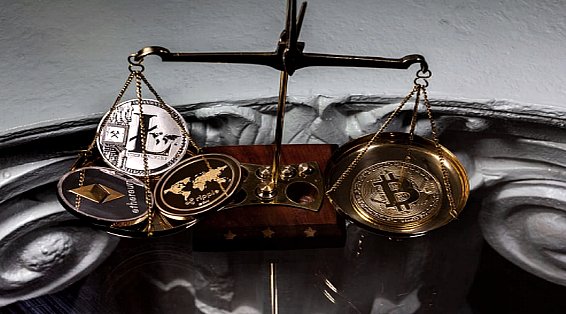Accredited InvestorsAltcoinAnatoli UnitskyAnti-Money Laundering (AML) In CryptoAPIArbitrageArtCoin TokenArticle DirectoryASICAuction Terminology GlossaryBasics of Stock Market InvestingBear MarketBest Crypto Payment Provider In the WorldBitcoinBlockchainBlockchain ConfirmationBlockchain Consensus MechanismBlockchain ForkBlockchain GlossaryBored Ape Yacht ClubBuild a Business That OutperformsBull MarketBuying SkyWay SharesByzantine Fault Tolerance (BFT) ExplainedCasascius CoinCentral Bank Digital Currency (CBDC)Centralized Crypto ExchangeCoinCoinsetCold WalletCollateralCommodity Futures Trading Commission (CFTC)Cross-Chain TechnologyCRUCrypto ExchangeCrypto GlossaryCrypto JokesCrypto Terms to KnowCrypto TickerCryptocurrencyCryptographyCryptojackingCryptounit BlockchainCryptounit GlossaryCryptounit ProgramdApp (Decentralized Application)Dead CoinDecentralized Exchange (DEX)Decentralized Finance (DeFi)Difference Between Bitcoin and EthereumDifferent Ways of Investing MoneyDigital CurrencyDistributed LedgerDo Your Own Research (DYOR)Dollar Cost Averaging (DCA)Dow Jones Industrial Average (DJIA)EncryptionERC-20ERC-721EthereumEvoScentFear Of Missing Out (FOMO)Fear, Uncertainty and Doubt (FUD)Fiat MoneyFNT Fintech CompanyGenesis BlockGlobal Unit PayGlossary of Banking TermsGlossary of Business TermsGlossary of Financial TermsHalvingHODLHot WalletHow Do I Start InvestingHow Rich is Satoshi Nakamoto?How to Create a BlockchainHow to Find Private InvestorsHow to Get Into FintechHow to Program Smart ContractsI Am Thrilled to Be a Part of This Global ProjectInitial Coin Offering (ICO)Initial Public Offering (IPO)Initial Token Offering (ITO)Innovation Basalt TechnologyInnovative Transportation TechnologiesInternational Bank Account Number (IBAN)Investing in Gold Mining StocksInvesting in Gold MiningJagerJoy of Missing Out (JOMO)Know Your Customer (KYC)LedgerLiquidity in CryptocurrencyMaker and Taker Fees in Crypto TradingMarket Capitalization (Market Cap)Meme CoinMetal Credit CardMetaMaskMillenials Now Have Access to Generational WealthMy Best Investment EverNew Digital EvolutionNFT GlossaryOff-Chain TransactionsOn-Chain TransactionsOpen Edition NFTPeer-to-Peer (P2P)Personal Loan GlossaryProbably the Best STO on the MarketProof of Stake (PoS)Real Estate Glossary of TermsReal Estate Investing GlossaryRebase TokenSecurities and Exchange Commission (SEC)Security Token ExchangesSecurity Token Offering (STO)Soulbound Decentralized Identities for Security TokensSoulbound ID Launch by Stobox Proves a SuccessSoulbound TokensStoboxStock Market GlossaryTestimonialsTether Platform and Token (USDT)UnitEx ExchangeUnitsky String TechnologiesUNTBUSDUValidatorWe Started Investing When We Were 25What are Blue Chip NFT?What are Blue Chip Stocks?What are Crypto Assets?What are Crypto Smart Contracts?What are CryptoPunks NFT?What are Digital Assets?What are Digital Collectibles?What are Gas Fees?What are Gas Wars?What are Hashmasks?What are Non Fungible Tokens?What are Non-Sufficient Funds (NSF)?What are Soulbound Tokens (SBT)?What are Stablecoins in Crypto?What are Transactions Per Second (TPS)?What are Utility NFTs?What are Utility Tokens?What Does Burning Crypto Mean?What Does Diamond Hands Mean?What Does Paper Hands Mean?What Does To The Moon Mean?What Does WAGMI Mean?What Happened to Satoshi Nakamoto?What is a 51% Attack?What is a Baby Boomer?What is a Backlink?What is a Banner?What is a Barcode?What is a Bid-Ask Spread in Crypto?What is a Block in Blockchain?What is a Block Reward?What is a Blockchain Address?What is a Blockchain Node?What is a Blockchain Oracle?What is a Blog?What is a Bond?What is a Bot?What is a Broker?What is a Business Accelerator?What is a Cash Cow?What is a Commercial Bank?What is a Commodity?What is a Con?What is a Credit?What is a Credit Limit?What is a Credit Rating?What is a Crypto Airdrop?What is a Crypto Bridge?What is a Crypto Scam?What is a Crypto Token?What is a Crypto Wallet?What is a Crypto Whale?What is a Crypto Winter?What is a Cryptocurrency Public Ledger?What is a Cryptocurrency Roadmap?What is a DAO?What is a Dark Pool?What is a Day Trader?What is a Dead Cat Bounce?What is a Default?What is a Derivative?What is a Digital Credit Card?What is a Fiscal Quarter?What is a Fungible Token?What is a Governance Token?What is a Grace Period?What is a Hard Fork?What is a Hot Wallet?What is a Hybrid Blockchain?What is a Hybrid PoW/PoS?What is a Joint Account?What is a Market Cap?What is a Merkle Tree in Blockchain?What is a Mining Farm?What is a Nonce? What is a PFP NFT?What is a POS System?What is a Prepaid Card?What is a Private Blockchain?What is a Private Key?What is a Public Blockchain?What is a Public Key?What is a Reserve Currency?What is a Ring Signature?What is a Routing Number?What is a Rug Pull in Crypto?What is a Safe Deposit Box?What is a Satoshi?What is a Security Token?What is a Seed Phrase?What is a Shitcoin?What is a Sidechain?What is a Soft Fork?What is a Spot Market?What is a State Bank?What is a SWIFT Code?What is a Tax Identification Number (TIN)?What is a Time Deposit?What is a Transaction Account?What is a Variable Interest Rate?What is a Virtual Assistant (VA)?What is a Virtual Card?What is a Virtual Currency?What is a Visa Card?What is a Whitelist in Crypto?What is a Whitepaper?What is Accounts Payable (AP)?What is AMA in Crypto?What is Amortization?What is an Accrual?What is an ACH Transfer?What is an Actuary?What is an Addendum?What is an Algorithm?What is an Angel Investor?What is an Annuity?What is an Asset?What is an ATM?What is an Atomic Swap?What is an Audit?What is an Avatar?What is an EIN?What is an Embargo?What is an Entrepreneur?What is an IDO (Initial Dex Offering)?What is an Interest Rate?What is an Internet cookie?What is an Investment Bank?What is an NFT Drop?What is an NFT Floor Price?What is an Ommer Block?What is an Orphan Block?What is an Outstanding Check?What is an Overdraft?What is Artificial Intelligence (AI)?What is B2B (Business-to-Business)?What is B2G (Business-to-Government)?What is Bartering?What is Bitcoin Dominance?What is Bitcoin Pizza Day?What is Blockchain Immutability?What is Blockchain Used For?What is BRICS?What is Business-to-Consumer (B2C)?What is C2C (Customer to Customer)?What is Capitalism?What is Catfishing?What is CFD Trading?What is Check Kiting?What is Cloud Mining?What is Communism?What is Content Marketing?What is Decentralization in Blockchain?What is DeFi in Crypto?What is Delisting?What is Depreciation?What is Digital Marketing?What is Diversification?What is Double Spending?What is Dumb Money?What is Dumping?What is Earnings Per Share (EPS)?What is Economics?What is Email Marketing?What is Equity?What is Etherscan?What is Fintech?What is Foreign currency?What is Forex?What is Fundamental Analysis (FA)?What is GameFi?What is Generative Art NFT?What is Gwei?What is Hard Currency?What is Hash Rate?What is Hashing in Blockchain?What is Inflation?What is Initial Game Offering (IGO)?What is Interest?What is Interest Income?What is Mainnet?What is Mastercard?What is Metaverse in Crypto?What is Mining in Cryptocurrency?What is Minting NFT?What is Mobile Banking?What is Money Laundering?What is NFT Alpha?What is NFT Metadata?What is NFT Rarity?What is NGMI Meaning?What is Nominal Interest Rate?What is Online Banking?What is Open-End Credit?What is OpenSea NFT Marketplace?What is Personal Identification Number (PIN)?What is Play-to-Earn?What is Polygon?What is Proof of Authority (PoA)?What is Proof of Work (PoW)?What is Public Key Cryptography?What is Pump and Dump?What is Quantum Computing?What is Refinancing?What is Retail Banking?What is Ripple?What is Sharding?What is Slippage in Crypto?What is Smart Money?What is Solvency?What is Soulbound ID?What is SSL?What is Staking in Cryptocurrency?What is Technical Analysis (TA)?What is Testnet?What is the Ask Price?What is the Better Business Bureau (BBB)?What is the Bid Price?What is the Dark Web?What is the InterPlanetary File System (IPFS)?What is the Gold Standard?What is the Lightning Network?What is the Prime Rate?What is the Sandbox?What is the Secondary Market?What is the World Bank?What is Tier 1 Capital?What is Tokenomics?What is TRC-20?What is Universal Banking?What is Unspent Transaction Output (UTXO)?What is Usury?What is Volatility in Crypto?What is Wash Trading?What is Web3?What is Whisper?What is XRP?What is Zero-Knowledge Proof (ZKP)?Who is Beeple?Who is Satoshi Nakamoto?Who is Vitalik Buterin?Why Tokenization is a Safe HavenWhy You Should Try Your Hand at Trading
Know Your Customer (KYC)
- Home
- Cryptounit Glossary
- Know Your Customer (KYC)
As worldwide regulatory bodies focus more on cryptocurrency transactions, it has become increasingly crucial for crypto exchanges to fulfill their anti-money laundering (AML) compliance obligations.

Specifically, crypto exchanges should tackle the anonymity issues linked with cryptocurrency transactions by incorporating appropriate Know Your Customer (KYC) procedures, which can help them identify their customers and comprehend how they are utilizing their platform.
What is Know Your Customer (KYC) in Crypto?
The advent of cryptocurrencies and blockchain technology has brought about a significant change in the financial industry. It has created a decentralized and unregulated system that enables people to transact with one another without the need for intermediaries such as banks.
However, the anonymity and pseudo-anonymity that come with crypto transactions have attracted bad actors to use the technology for illegal activities such as money laundering and terrorism financing. To counter this, Know-Your-Customer (KYC) protocols have been introduced in the crypto industry to enhance transparency and prevent criminal activities. Let`s explore what KYC is in crypto and its importance.
What is Know-Your-Customer (KYC)?
KYC is a process used by financial institutions, including crypto exchanges, to verify the identity of their customers. The process involves collecting personal information such as name, address, date of birth, and government-issued identification documents like passports or driver’s licenses. The information collected is used to confirm the identity of the customer and to assess the risk of doing business with them. KYC is a critical component of Anti-Money Laundering (AML) and Combating the Financing of Terrorism (CFT) laws.
Why is KYC important in the crypto industry?
The decentralized nature of cryptocurrencies makes it difficult for authorities to trace transactions and identify users. This has made the technology a haven for money launderers and terrorists, who use the anonymity to cover their tracks. KYC protocols in the crypto industry are crucial in identifying users, preventing criminal activities, and ensuring that the industry operates in compliance with AML and CFT laws.
KYC protocols also provide a level of security for users. When users are required to provide personal information, it makes it harder for bad actors to steal identities or hack into accounts. This helps to protect the funds and assets of users.
What are the KYC requirements in the crypto industry?
Different crypto exchanges have varying KYC requirements. However, the following are common requirements:
- Proof of identity: This can be a government-issued identification document such as a passport or driver’s license.
- Proof of address: This can be a utility bill or bank statement.
- Selfie verification: Some crypto exchanges require users to take a selfie with their identification document to verify their identity.
- Source of funds: Users may be required to explain the source of the funds they are using to trade cryptocurrencies.
KYC protocols are a necessary requirement in the crypto industry. They enhance transparency, prevent criminal activities, and protect users’ assets. With the regulatory spotlight increasingly shining on cryptocurrencies, it is essential for crypto exchanges to have robust KYC protocols in place to ensure compliance with AML and CFT laws.
Although the process may be cumbersome, it is necessary to ensure that the crypto industry remains a safe and trustworthy environment for all users.
Crypto Exchange Know Your Customer (KYC) Risks
Cryptocurrency exchanges face a complex KYC compliance landscape, with evolving regulations and emerging criminal methodologies adding to the challenge. To develop and implement an effective KYC solution, exchanges should be aware of the following vulnerabilities and risks:
- Anonymity: Cryptocurrency transactions offer anonymity, making it easy for money launderers to exploit the system. Exchanges should use digital controls, such as biometric information, to enhance their identity verification process.
- Transaction speed: Cryptocurrency funds can be moved quickly, which can outpace AML/CFT controls. Exchanges should ensure their checks and monitoring processes can keep up with transaction speeds.
- Structured transactions: Money launderers may try to evade reporting thresholds by structuring transactions in small amounts across multiple accounts. Exchanges should prevent the creation of multiple accounts and share information with other financial service providers to detect and prevent this.
- Money muling: Money launderers may coerce third parties to use exchanges on their behalf. Exchanges should perform due diligence and identify customers whose profiles don't match their expected financial behavior to detect money mules.
- Negative customer experiences: Inadequate KYC procedures can negatively impact customer experiences. KYC allows exchanges to build detailed risk profiles and adjust their AML/CFT controls accordingly, optimizing experiences for lower-risk customers and ensuring speed and efficiency where onerous scrutiny isn't required.
By being aware of these vulnerabilities and risks, cryptocurrency exchanges can develop and implement effective KYC solutions that comply with regulations and protect their customers' assets.
Benefits of Know Your Customer (KYC) in Crypto
Although implementing KYC standards in cryptocurrency exchanges can present operational challenges, regulatory compliance provides significant benefits, as outlined below:
- Increased transparency and customer trust: Verifying user identities enhances transparency and customer trust. When customers feel confident that their exchange is taking proactive measures to safeguard their accounts, they are more likely to continue using the service.
- Reduced fraud and money laundering: From January 2021 to March 2022, over $1 billion in crypto was lost to fraudsters, with more than 46,000 consumers reporting losses. Robust identity verification can significantly reduce fraudulent activity and improve market reputation.
- Reduced legal risk: As legal requirements evolve, businesses that implement effective KYC processes can stay ahead of the curve. KYC methods enable exchanges to prevent fake identities, money laundering, and assess customer risk by requiring government-issued identification and identifying financial history and assets. These steps allow businesses to reduce legal and regulatory risks and focus on increasing conversion rates, expediting transactions, and ensuring compliance.
- Increased market stability: The cryptocurrency market's notorious volatility is often due to suspicious and anonymous transactions. KYC programs that include enhanced identity verification contribute to the market's stability and value growth.
By implementing effective KYC processes, cryptocurrency exchanges can enhance transparency, reduce fraud and money laundering, reduce legal risks, and contribute to market stability, ultimately benefiting their customers and their businesses.
Related Articles

Crypto Exchange
A Crypto Exchange is a marketplace where digital currencies and other financial instruments can be traded. Crypto Exchanges are classified into two types: centralized exchanges (CEX), such as Binance, Coinbase Exchange, UnitEx, or Kraken, and decentralized exchanges (DEX), such as Uniswap, or PancakeSwap.

Cryptocurrency
The Greek dictionary meaning of crypto is "hidden" or "secret," which precisely describes the privacy and cryptographic security that cryptocurrencies give.

Blockchain
Blockchain transactions take place on a peer-to-peer network of geographically dispersed computers (nodes). Each node keeps a copy of the...
- Home
- Cryptounit Glossary
- Know Your Customer (KYC)